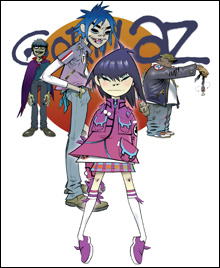
CHAMPS: And you thought Prodigy were a cartoon.
|
Remember the great electronica gold rush of ’97, the year Madonna’s Maverick label won a massive bidding war over long-ignored rave mystic Liam Howlett, a/k/a Prodigy, and we all grooved to the electropunk clash of “Smack My Bitch Up”? Howett had wisely spiced up his space jams with a veritable Village People’s worth of caricatures — the snotty punk and the heavy-metal guitarist are the two I remember most clearly from the circus surrounding Howlett at his control console at Avalon. But rave culture was as uniquely British as treacle and tube-station fruit machines. And, as hard as we may have tried to create something similar in the US, it just didn’t have the air of subversive danger that characterized it in the UK. Sure, there were late-night loft parties in most major US cities. But those had been going on since heaven knows when. And if the soundtrack suddenly changed to something more ecstasy-friendly, with chill-out rooms and all the rest, it certainly didn’t amount to the sea change we’d been promised.Or did it? The sprawling States are very different from our island-bound ally across the Atlantic. It takes a lot longer for cultural shifts to embed themselves here. And, by the time something that exploded in the UK — from punk rock to electronica — has been given a chance to sink in, it’s usually undergone all kinds of shifts in shape and form and purpose. Like a long game of telephone, what you end up with bears very little resemblance to the original. Just like American punk — a diverse underground that counted bands as stylistically divergent as the Dead Kennedys, Black Flag, the Minutemen, X, Hüsker Dü, Mission of Burma — electronica in the US was bound to look and sound very different from its counterpart in the geographically concise UK.

So what did happen to the electronica that fueled British rave culture? Take a quick look at the big winners on the national side of this year’s Best Music Poll, and the answer jumps right out. Because this is the first year in the Poll’s history that it even made sense to nominate the same artist for Best DJ/Dance Act and Best National Act and Best National Album and Best National Song. Gorillaz didn’t win all four. But they won the two that mattered — Best National Act and Best DJ/Dance Act. It’s hard to know exactly what to call a “band” who are more of a project based around Blur frontman Damon Albarn, an illustrator (Jamie Hewlett) responsible for creating the cartoon images of the imaginary band’s members, and — most important — a celebrity DJ with the skills to match his renown. And you thought Prodigy were a cartoon.
With Gorillaz, Albarn’s touched a cultural nerve by placing all the electronic trappings of DJ culture and dance-club aesthetics in the context of a fake pop band who make real music. For the first album, a 2001 homonymous caper on Virgin, Dan the Automator was the behind-the-scenes star, while Albarn, Kid Koala, Del tha Funkee Homosapien, and Cibo Matto’s Miho Hatori, among others, collaborated on a cut-and-paste collection of songs that found common ground for hip-hop beats, rockist guitars, pop piano lines, and even a little detour into Cuban son courtesy of a cameo by the Buena Vista Social Club’s Ibrahim Ferrer.
Even matching the party vibe of the first album’s pan-cultural playground would have been an accomplishment. But, by bringing aboard mash-up master DJ Danger Mouse for Demon Days (Virgin), Albarn one-upped himself. The cast of cameo characters is every bit as diverse: De La Soul, Roots Manuva, Martina Topley-Bird, Happy Monday frontman Shaun Ryder, and even Dennis Hopper. But the real key to Gorillaz’ success is the ease with which Albarn and company resurrect electronica stripped of its rave baggage, ready for prime-time play as universal pop music, devoid of cultural and geographic boundaries. Albarn has placed himself at the forefront of a trend that erases borders between cultures and countries, styles and styluses, new waves and old schools. Electronica may not have exploded in the US as it did in the UK, but 10 years later DJs are celebrities in America as well as the rest of the world, neo–new wave has embraced the cut-and-paste aesthetic of the remix, and dance grooves cut across every segment of the pop world, from the Clap Your Hands indie underground to mainstream American idols.
It’s interesting that, at the same time, almost as a reaction against the cartoon characters Gorillaz hide behind, indie rock has shed irony in favor of the earnest singer-songwriter, typified by Death Cab for Cutie frontman Ben Gibbard. That Plans, the willfully drab Seattle foursome’s major-label debut on Atlantic, beat out the likes of the White Stripes, Gorillaz, and even hip-hop superstar Kanye West for Best Album is no surprise. It’s worth noting that Gibbard himself has toyed with electronica in his other band, the Postal Service. And, since Plans seemed like a bit of a letdown after the more majestic Transatlanticism, I’m inclined to believe that Death Cab’s triumph is more the result of a cumulative groundswell of appreciation than a genuine, all-consuming belief that Plans is a great album.